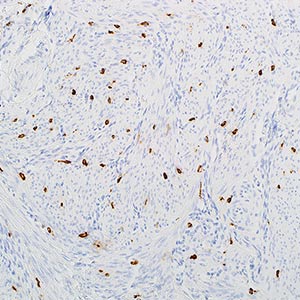
Tryptase (EP259)

Tryptases comprise a family of trypsin-like serine proteases (peptidase family S1). Tryptases are stored in mast cell secretory granules and basophils. These enzymes are released into the extracellular environment and are resistant to all known endogenous proteinase inhibitors. Several tryptase genes are clustered on chromosome 16p13.3. There are two separate genes: alpha and beta 1. Beta tryptases appear to be the main isoenzymes expressed in mast cells whereas in basophils, alpha tryptases predominate. Anti-tryptase is a good marker for mast cells, basophils, and their derivatives.1 Mastocytosis is a term collectively used for a group of disorders in which there is abnormal accumulation of mast cells in one or multiple organs. Anti-tryptase, combined with anti-CD2, anti-CD25, and anti-CD117, can be useful in identifying reactive mast cell hyperplasia, myelogenous neoplasms, mast cell leukemia, and mastocytosis. Morphologically occult involvement of normal-appearing bone marrow by systemic mastocytosis will be missed without appropriate clinical suspicion and pathologic evaluation by tryptase and CD25 IHC and KIT D816V mutation analysis.2-5 As assessed by immunohistochemistry, mast cells are immunoreactive for tryptase and CD68R. In contrast, the CD2 antigen that is expressed in mast cells in patients with indolent systemic mastocytosis is not detectable.6
